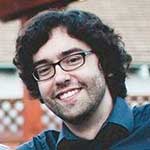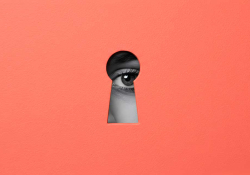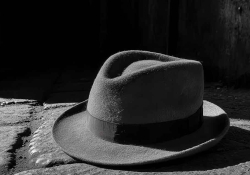A Pestilence

A doctor on his village rounds confronts the same symptoms again and again, including uncontrollable laughter.
The first patient of the day is an old woman. The doctor hears her laughter as he walks through the doorless entryway of the small house. Today it is a quiet, throaty laugh, measured but sustained, coming from a back room and mixing with the sounds of children running around the main room and a woman cooking in the kitchen. Some might not even notice the laughter on entering this house, but the doctor hears what he has come to hear, knows the sound intimately now, can spot it in a storm or over the roar of a plane engine. The children run past him, the woman in the kitchen hardly glances up from her work as he makes his way to the back room. The old woman is lying in bed looking vaguely up at the ceiling, her small body racked with chuckles. The doctor does what he always does: he lifts the sheet, presses the stethoscope to her chest, listens to the laughter boom in his ears. He cannot help her, he can only observe.
He observes them all, this way. There are so many, if he can just keep watch on them all day and night, at some point one of them will reveal to him their secret. He takes a thermometer out of his bag—one of the few medical tools he’s been able to hold onto in this poor village—and he takes her temperature. She is one of the few who can sit still long enough for this—her body shakes with her slow deep laughter, but her lips only tremble. She is not hysterical like some of the others, who he has trouble keeping still as they rock and double over in their mirth. Her temperature is normal, as always. Now he straightens up and asks her how she is. She seems to notice him for the first time, looks up at him and continues to chuckle, looks away. He tries to gain understanding from this glimpse—what is she saying to him, eyeball to eyeball, crying out from underneath her laughter? Again he is left with nothing, he leaves as unheeded as he arrived, and goes to the next house.
This laugh is uncontrollable, unpredictable, and violent.
He begins to sweat as he approaches this house, not because the sun is now directly overhead, hardening the muddy street, but because he can already hear the laughter, the worst of all. A high-pitched noise, rapid and breathy at times, deep and bellowing at others—this laugh is uncontrollable, unpredictable, and violent. He enters the house. The couple is standing in the other doorway into the room. They are tall and thin, their faces gray. They have not slept, he can tell, but their eyes are not glazed—their eyes are focused on the bassinet in the living room. The couple’s eyes are wide and alert, and the doctor wonders what expression ears would give if they could change their look.
He approaches the baby. It rocks back and forth, its tiny body jiggling as if beset by hiccups. He stands for a second observing. The baby’s head is turned to the side, it is taking sharp breaths. Then the laughter that had subsided upon the doctor’s entrance picks up again, the baby squeaks and titters. The laugh rapidly becomes a giggle, then makes its way up the scale to a pitch so high the doctor steps away. He pretends to search in his bag. In the doorway the parents cover their ears. The baby’s toothless mouth opens wide as the laugh changes: Now it is the laugh of an adult, full and resonant. It fills the room and comes impossibly from that soft, almost formless face, from that wide-open mouth that splits the face in two.
When this laugh has subsided into a chuckle reminiscent of the old woman’s, the doctor listens with the stethoscope. He listens to the tiny rapid heartbeat, loud and clear under the beating wing sound of the laughter. He will not take this one’s temperature, he does not want to touch it, he wants to spend as little time in this house as possible. He promises the parents he will be back later—they nod at him as he leaves. He doesn’t know if he means it.
The doctor has visited the oldest and the youngest. The time is noon. He now heads for his next patient, who lives in the exact center of town. He makes his visits in this way, symmetrically, imposing on them an order they do not possess on their own. He takes a moment to arrange his few medical tools in his bag as he sits by the bedside. This man is alone—only the people in the apartments next to his can report on his condition, and they are not helpful. They can tell the doctor what they hear throughout the day, but he already knows what they hear, this same laughter he hears now: appreciative, infectious, like a man at a comedy show. The doctor rummages in his bag, puts the thermometer in a side pocket, the adhesive strips together in a pile. He sits observing for a moment. In a low voice he questions the man.
The room is silent again—silent except for laughter, which takes the place of silence in this town.
How do you feel? Have you slept? Can you understand me? The man is not feverish, he can tell from across the room. The room is silent again—silent except for laughter, which takes the place of silence in this town. If you are sick, why don’t you die? The doctor has surprised himself by saying this out loud. But he has long wondered—his patients are sick with an illness that makes them laugh and they do not get better and they do not get worse. If they are sick and he can’t help them then they should die. When the doctors cannot help you anymore, you die. This is the next step in the course of treatment, and the doctor is impatient for it. He sits a while longer and waits for the man to die. But this man, like the others, just laughs. The doctor leaves without examining him at all.
The sun bakes the street outside. There are no birds—there have not been for some time. The doctor has not decided which patient to visit next, or if he’ll visit any more today. He walks down the street; he focuses on one foot in front of the other. Around him he hears laughter, carried on the wind, and he thinks, maybe they are laughing at me. Now the part of his day that he fears most occurs: he hears someone laughing nearby, a high-pitched tattoo of a laugh, and as he passes by he smiles and tries to regulate his breathing and bites the inside of his cheek.















